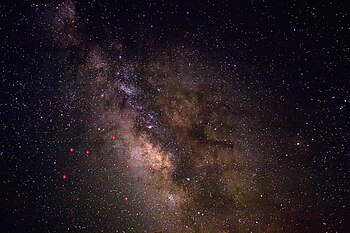
Annunciation to the Shepherds by David Collins (Wikipedia Commons)
For those who live in cities where the night sky is a mere reflection back of the lights, stars and galaxies may not be as common as they are to others.
People like shepherds who spend time away from city lights, often far from civilization, who have plenty of time on their hands.
Or maybe even pilots cruising the night sky above the clouds as they wing their way from point to point.
Before the electric light, though, the expanse of the heavens closed in as night spread across the sky and prickled darkness with dots of lights: stars and planets clustering into constellations and galaxies.
When the night is dark, they seem closer–almost like a cold blanket tossed overhead.
To me, the heavens are exotic and distant and while I can recognize a few constellations, for the most part they’re unknown holes poked into the ceiling of night. I love to see them, but they’re anonymous to me.
My son, however, is an astronomer. I asked him how he viewed the sky–were they all friends he recognized instantly?
“Stargazer” laughed:
“When I look at the sky, I seek my bearings immediately. I find a well-known star like Polaris, and that tells me where I am. From there, I can recognize almost anything.”
(Indeed, a member of his former boy scout troop never got over spending an evening in the High Sierras listening to Stargazer as he described the wheeling stars and told their stories.)
Familiarity with the night sky is central to several important aspects of the nativity story. Men who spent most nights staring at the stars were completely familiar with what went where and when. They were uniquely situated, once they found Polaris, to see unusual changes in the night sky. Two groups in particular were affected: astronomers in the east often known as magi, and simpler men: shepherds watching their flocks by night.

A view of the night sky near Sagittarius, enhanced to show better contrast and detail in the dust lanes. The principal stars in Sagittarius are indicated in red. (Photo credit: Wikipedia)
On the night of Christ’s birth, Luke tells us
there were in the same country shepherds living out in the fields, keeping watch over their flock by night. And behold, an angel of the Lord stood before them, and the glory of the Lord shone around them, and they were greatly afraid.”
As was his custom, the angel told them not to be afraid and then passed on the extraordinary news that the Messiah they’d been expecting forever had been born that day in the city of David.
It’s important to remember the hill country around Jerusalem had been filled with news of extraordinary events–the priest Zachariah had been struck dumb while serving in the Jerusalem temple. The elderly man returned home and his elderly wife, known to be barren, had become pregnant and produced a child some months before. While likely not privy to details, this particular group of men were watching over their sheep when an angel appeared.
As soon as the angel finished announcing his extraordinary news, a multitude of the heavenly host praising God joined him.
Were they angels in the sky?
Stars dancing in the heavens?
Incredible movement where movement should not have been?
The text is not clear, but it did note that “when the angels had gone away from them into heaven,” the shepherds headed into Bethlehem to see what the heavenly host were singing about.
“Gone away into heaven,” meaning up into the night sky?
Maybe.
But something extraordinary happened to those citizens that night.
When we’re out camping or far from city lights and I look up into the night sky, sometimes I can see the cloudy blur of stars that marks the Milky Way Galaxy. My Stargazer laughs at me–he knows those stars and planets well.
I try to imagine what the night sky looked to those shepherds 2000 years ago.
They must have seen something unusual.
Well, how else would you describe the arrival of their savior and ours into the world?
Tweetables
Shepherds watching the sky to see something new and completely different. Click to Tweet
The night sky, the shepherds, and the savior of the world. Click to Tweet
(On a completely unrelated subject, did you ever wonder why it is that astronomers and pilots–people who spend a lot of time staring at the night sky–rarely have reported seeing UFOs? Astrophysicist Hugh Ross has an interesting answer and you can read about it in his book Lights in the Sky and Little Green Men!)


Here in New Mexico, the night sky is quite a sight. The Milky Way is very distinct, and one can even see the gegenschein, the interplanetary dust in the plane of the ecliptic, lit by the sun several hours before the dawn.
I’m not entirely sure about my ‘relationship’ with the night sky. I can find my way around it well enough – it was a professional requirement. But for awhile it chilled my soul.
Now, I think we’re on better terms, and I can once again see it in something of the way C.S. Lewis did in his SF trilogy, and the light and spacious home of the eldila.
Hope you had a wonderful Christmas!
Michelle, I recently read this article, with a new theory on what the wise men saw in the sky…
http://www.christianitytoday.com/ct/2014/december/o-subtle-star-of-bethlehem.html
Aaaaand…this comment is just so I can click on the “Notify me of new comments via email”, which I forgot to do when posting my comment above. 🙂
Interesting, Karen. Thanks for the link–which should appear in the next post! 🙂
Okie dokie.